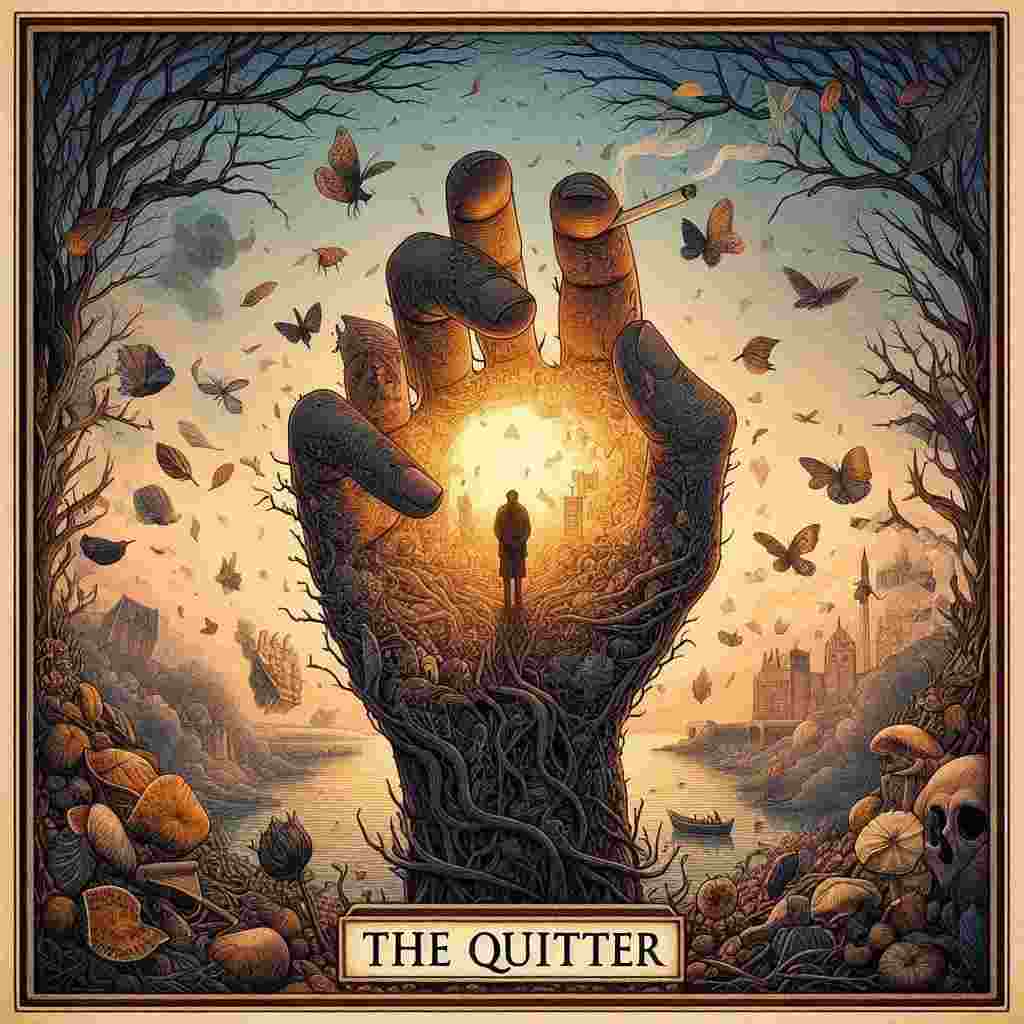The Quitter
Robert W. Service
1874 to 1958

When you're lost in the Wild, and you're scared as a child,
And Death looks you bang in the eye,
And you're sore as a boil, it's according to Hoyle
To cock your revolver and . . . die.
But the Code of a Man says: “Fight all you can,”
And self-dissolution is barred.
In hunger and woe, oh, it's easy to blow . . .
It's the hell-served-for-breakfast that's hard.
“You're sick of the game!” Well, now, that's a shame.
You're young and you're brave and you're bright.
“You've had a raw deal!” I know — but don't squeal,
Buck up, do your damnedest, and fight.
It's the plugging away that will win you the day,
So don't be a piker, old pard!
Just draw on your grit; it's so easy to quit —
It's the keeping-your-chin-up that's hard.
It's easy to cry that you're beaten — and die;
It's easy to crawfish and crawl;
But to fight and to fight when hope's out of sight —
Why, that's the best game of them all!
And though you come out of each gruelling bout,
All broken and battered and scarred,
Just have one more try — it's dead easy to die,
It's the keeping-on-living that's hard.
Robert W. Service's The Quitter
Robert W. Service, often called "The Bard of the Yukon," is renowned for his rugged, narrative poetry that captures the trials and triumphs of life on the frontier. In The Quitter, Service presents a stirring meditation on perseverance and the indomitable human spirit. Through a combination of colloquial diction, direct address, and a structured rhyme scheme, the poem conveys its central theme: the moral imperative and difficulty of enduring life's hardships. The speaker urges resilience in the face of adversity, extolling the virtues of grit and determination over surrender.
Structural and Formal Analysis
The poem adheres to a consistent ABAB rhyme scheme, reinforcing its rhythm and making it akin to an encouraging anthem or ballad. Service's use of iambic tetrameter, though not rigidly maintained throughout, provides a steady cadence that mirrors the persistence the poem advocates. The repetition of parallel structures, such as "It's easy to... It's the..." and "It's the... that's hard," creates a refrain-like quality, emphasizing the contrast between surrender and endurance.
Each stanza is self-contained, offering a distinct yet interconnected reflection on the challenges of survival and the virtues of perseverance. This segmentation enables the reader to digest the moral lessons incrementally while reinforcing the cumulative message.
Thematic Analysis
At its core, The Quitter explores the dichotomy between the ease of giving up and the difficulty of enduring hardship. The theme of stoicism—the idea that strength comes not from the absence of pain but from enduring it—is woven throughout the poem.
-
Adversity and Courage:
- In the first stanza, the speaker sets the stage with an image of existential dread: "When you're lost in the wild and you're scared as a child." This vivid scenario captures the universal feeling of vulnerability, comparing it to childhood fear. The reference to "death looks you bang in the eye" personalizes danger, making it immediate and relatable.
- The juxtaposition between the "code of a man" and "self-dissolution" presents the moral framework of the poem, where surrender is dismissed as an unworthy option. The line, "It's the hell served for breakfast that's hard," encapsulates the crux of the struggle: the sheer grind of enduring daily suffering.
-
Resilience vs. Resignation:
- In the second stanza, the speaker shifts tone to one of camaraderie, addressing the reader as "old pard." This casual term of endearment fosters intimacy, aligning the speaker and reader as partners in a shared struggle.
- The imperative "Buck up, do your damnedest and fight!" is both a call to action and a reminder of the stakes. The advice to "plug away" reinforces the idea that persistence, not brilliance or luck, leads to triumph.
-
The Heroism of Living:
- The final stanza underscores the heroic nature of enduring hardship even when hope is absent. Phrases like "hope's out of sight" and "broken and beaten and scarred" acknowledge the inevitability of failure and suffering, but the concluding exhortation—"Just have one more try"—affirms the nobility of continuing despite these setbacks.
- The repeated contrast between death ("It's dead easy to die") and survival ("It's the keeping on living that's hard") crystallizes the central argument of the poem: resilience is the ultimate human challenge and achievement.
Literary Devices
Service employs a variety of literary devices to reinforce his themes:
-
Colloquial Language: The use of conversational terms like "pard," "squeal," and "piker" lends the poem an informal, relatable tone. This choice makes the moral lesson feel accessible rather than preachy.
-
Imagery: Vivid depictions of hardship, such as "hell served for breakfast" and "broken and beaten and scarred," create an almost tactile sense of the struggles the speaker describes. These images emphasize the physical and emotional toll of perseverance.
-
Parallelism and Repetition: The repeated phrasing in "It's easy to... It's the..." contrasts simplicity with difficulty, driving home the message that meaningful actions are inherently arduous.
-
Antithesis: The poem hinges on oppositions—life vs. death, quitting vs. enduring, ease vs. difficulty. This rhetorical device sharpens the moral stakes of the choices the speaker presents.
Conclusion
The Quitter is a powerful affirmation of resilience, championing the human capacity to endure despite overwhelming odds. Through its colloquial yet poignant language and tightly structured form, the poem offers not just a critique of surrender but an ode to the quiet heroism of persistence. By presenting endurance as the ultimate challenge and triumph, Robert W. Service encourages readers to embrace life's struggles as opportunities for growth and courage. The poem's enduring relevance lies in its universal appeal, reminding us that while quitting is easy, the true measure of character lies in the resolve to persevere.
This text was generated by AI and is for reference only. Learn more
Want to join the discussion? Reopen or create a unique username to comment. No personal details required!



Comments
No comments yet. Be the first to comment!